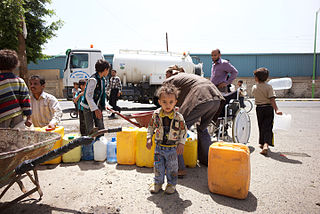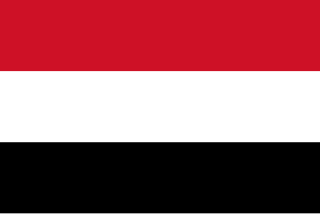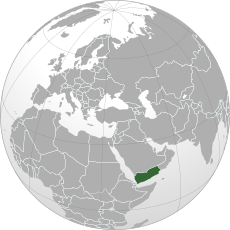The Houthi insurgency in Yemen, also known as the Houthi rebellion, the Sa'dah War, or the Sa'dah conflict, was a military rebellion pitting Zaidi Shia Houthis against the Yemeni military that began in Northern Yemen and has since escalated into a full-scale civil war. The conflict was sparked in 2004 by the government's attempt to arrest Hussein Badreddin al-Houthi, a Zaidi religious leader of the Houthis and a former parliamentarian on whose head the government had placed a $55,000 bounty.

The Houthi movement, officially called Ansar Allah and colloquially simply Houthis, is an Islamist political and armed movement that emerged from Saada in North Yemen in the 1990s. The Houthi movement is a predominately Zaidi Shia force, whose leadership is drawn largely from the Houthi tribe.

The Cabinet of Yemen refers to the governing body of the internationally recognized Yemen government led by the Chairman of the Presidential Leadership Council Rashad al-Alimi who replaced former President of Yemen Abdrabbuh Mansur Hadi on 7 April 2022 as the new President of Yemen. He then selected new cabinet members of the Yemeni Government.
Abdul-Malik Badruldeen al-Houthi is a Yemeni politician and religious leader who serves as the leader of the Houthi movement, a revolutionary movement principally made up of Zaidi Muslims. His brothers Yahia and Abdul-Karim are also leaders of the group, as were his late brothers Hussein, Ibrahim, and Abdulkhaliq. Abdul-Malik Houthi is the leading figure in the Yemeni Civil War which started with the Houthi takeover in Yemen in the Saada Governorate in northern Yemen.

The National Dialogue Conference (NDC) was a transitional dialogue process held at the Movenpick Hotel in Sanaa, Yemen from March 18, 2013 to January 24, 2014, as part of the Yemeni crisis reconciliation efforts.

The Houthi takeover in Yemen, also known as the September 21 Revolution, or 2014–15 coup d'état, was a popular revolution against Yemeni President Abdrabbuh Mansur Hadi led by the Houthis and their supporters that pushed the Yemeni government from power. It had origins in Houthi-led protests that began the previous month, and escalated when the Houthis stormed the Yemeni capital Sanaa on 21 September 2014, causing the resignation of Prime Minister Mohammed Basindawa, and later the resignation of President Abdrabbuh Mansur Hadi and his ministers on 22 January 2015 after Houthi forces seized the presidential palace, residence, and key military installations, and the formation of a ruling council by Houthi militants on 6 February 2015.
Mohammed Ali al-Houthi is a Yemeni political figure who is the former President of the Revolutionary Committee or Revolutionary Council, a body formed by Houthi militants and the de facto President of Yemen. He was one of the military field commanders who led the group's seizure of the Yemeni capital Sana’a in September 2014, and eventually became the de facto leader of Yemen after the Houthi takeover of the Yemeni government in 2015. He is a cousin of Abdul-Malik Badreddin al-Houthi, the group's leader.

The Yemeni Crisis began with the 2011–12 revolution against President Abdullah Saleh, who had led Yemen for 33 years. After Saleh left office in early 2012 as part of a mediated agreement between the Yemeni government and opposition groups, the government led by Saleh's former vice president, Abdrabbuh Mansur Hadi, struggled to unite the fractious political landscape of the country and fend off threats both from Al-Qaeda in the Arabian Peninsula and from Houthi militants that had been waging a protracted insurgency in the north for years.

The Yemeni Civil War is an ongoing multilateral civil war that began in late 2014 mainly between the Rashad al-Alimi-led Yemeni government and the Houthi armed movement, along with their supporters and allies. Both claim to constitute the official government of Yemen.

On 26 March 2015, Saudi Arabia, leading a coalition of nine countries from West Asia and North Africa, launched an intervention in the Yemeni Civil War in response to calls from the president of Yemen Abdrabbuh Mansur Hadi for military support after he was ousted by the Houthi movement. The conflict ignited between the government forces, the Houthi rebels and other armed groups after the draft constitution and power-sharing arrangements collapsed, despite progress in the political transition led by the United Nations at that time, leading to an escalation of violence in mid-2014. The Houthis and allied units of the armed forces seized control of Sana’a and other parts of the country in September 2014 and in the following months. This prompted President Hadi to ask Saudi Arabia to intervene against the Iranian-backed Houthis.
International reactions to the Saudi-led intervention in Yemen of 2015 were mixed. Most other Arab League nations and several Western governments backed the Saudi Arabia-led military coalition, but other governments warned against an escalation in the violent situation in Yemen.
Human rights violations, committed by all warring parties, have been widespread throughout the Yemeni Civil War. There are two main groups involved in the ongoing conflict: forces loyal to the current Yemeni president, Abdrabbuh Mansur Hadi, and Houthis and other forces supporting Ali Abdullah Saleh, the former Yemeni president. On 29 November 2017, fighting between forces loyal to Ali Abdullah Saleh and the Houthis began in Sana'a. al-Qaeda in the Arabian Peninsula and the Islamic State of Iraq and the Levant have also carried out attacks in Yemen. Coalition forces led by Saudi Arabia and backed by the United States and other nations have also been accused of violating human rights and in some cases, breaking international law. The coalition forces intervened at Hadi's request, in an attempt to defeat the Houthis and restore Hadi's government. Coalition attacks, especially airstrikes, have been accused of causing large scale civilian deaths, but Saudi Arabia disputes these claims. The use of force by these groups has exacerbated the humanitarian crisis situation in Yemen, as critical infrastructure has been damaged or destroyed in attacks. In addition to the attacks, blockades of critical resources, such as fuel, to Yemen by Saudi Arabia have hindered the transport of food in Yemen, and the ability of civilians to travel to locations where there are adequate medical facilities.

The blockade of Yemen refers to a sea, land and air blockade on Yemen which started with the positioning of Saudi Arabian warships in Yemeni waters in 2015 with the Saudi Arabian-led intervention in Yemen. In November 2017, after a Houthi missile heading towards King Khalid International Airport was intercepted, the Saudi-led military coalition stated it would close all sea land and air ports to Yemen, but shortly began reopening them after criticism from the United Nations and over 20 aid groups and some humanitarian supplies were allowed into the country. In March 2021, Saudi Arabia denied the blockade continued, however, UN authorized ships continued to be delayed by Saudi warships.

The siege of Al Hudaydah, codenamed Operation Golden Victory, was a major Saudi-led coalition assault on the port city of Al Hudaydah in Yemen. It was spearheaded by the United Arab Emirates and Saudi Arabia and has been considered as the largest battle since the start of Saudi Arabian-led intervention in Yemen in 2015.

United Nations Security Council Resolution 2564 was unanimously adopted on 25 February 2021. It calls for a nationwide sanctions in Yemen. According to the resolution, the Security Council renews ban on destabilizing actors in Yemen, but Houthis reject latest resolution.
The 2022 Abu Dhabi attack was a terrorist attack against three oil tanker trucks and an under construction airport extension infrastructure in Abu Dhabi, United Arab Emirates conducted by the Houthi movement using drones and missiles. Although several missiles and drones were intercepted, 3 civilians were killed and 6 were injured by a drone attack.
During the presidency of Barack Obama, the United States began providing Saudi Arabia with critical support to "sustain" the Saudi Arabian–led intervention in the Yemeni Civil War, later expanded during the presidency of Donald Trump. This support included logistical and intelligence aid. Trump vetoed a bipartisan bill in 2019 aimed at stopping U.S. support for the Saudi-led coalition in Yemen. In 2021, Joe Biden vowed to halt U.S. support for the war, though U.S. arms sales to the coalition have continued.
The Riyadh Agreement was signed in the capital city of Saudi Arabia, Riyadh, between the Saudi-backed Hadi-led government of Yemen and the UAE-backed Southern Transitional Council (STC) on 5 November 2019. It followed the Southern Yemen clashes of August 2019, with the goal of ending the fighting and establishing a united front against the Iran-backed Houthi rebels, dominant in the north of the country.

On 14 April 2015, the United Nations Security Council adopted Resolution 2216 on Yemen. Fourteen members of the Council voted in favor, while only Russian Federation abstained. The Resolution imposed sanctions on individuals undermining the stability of Yemen, calling all Yemeni parties, in particular the Houthis, to end violence and refrain from further unilateral actions that threatened the political transition.

The United Nations Security Council Resolution 2204 was unanimously adopted by the Security Council on 24 February 2015. The Council extended sanctions on individuals threatening the stability of Yemen, as well as the mandate of the Panel of the Expert on Yemen for one year.









